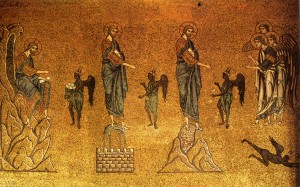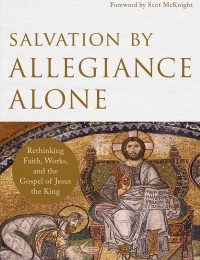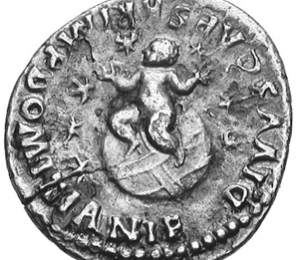
The Temptations of Christ, 12th century mosaic at St Mark’s Basilica, Venice.
On a recent episode of Word Matters, Trevin Wax and I discussed Mark’s rendering of Jesus’s temptation in the wilderness, particularly the unique insertion of the phrase, “He was with the wild animals” (Mark 1:13, HCSB).
After discussing the prominent views of this passage throughout church history, Trevin and I both landed at the same conclusion: Mark is recapitulating the temptation scene of Genesis 3. He shows Jesus as the Second Adam who stands among the wild animals (including the serpent, Satan) and fulfills mankind’s true purpose of choosing God over Satan’s temptations. And as Matthew’s more detailed account shows, Jesus the God-man reclaims humanity’s authority over creation and inaugurates the coming of God’s kingdom back to earth. When Jesus stands victorious over Satan and is not attacked by the wild animals, we see a picture of what Eden was supposed to be and what New Creation will be:
“The wolf will live with the lamb,
and the leopard will lie down with the goat.
The calf, the young lion, and the fatling will be together,
and a child will lead them.” (Isa. 11:6, HCSB)
“Look! God’s dwelling is with humanity,
and He will live with them.
They will be His people,
and God Himself will be with them
and be their God.
He will wipe away every tear from their eyes.
Death will no longer exist;
grief, crying, and pain will exist no longer,
because the previous things have passed away.” (Rev. 21:3-4, HCSB)
Since the podcast episode is only about 15 minutes long, we weren’t able to go fully in depth about why we preferred this interpretation, but thankfully Jason Kees wrote a fantastic response piece giving more light to this idea. Here’s a snippet:
“Jesus is in the wilderness forty days (τεσσεράκοντα), and there is great warrant to see him fulfill what Israel failed to do after the exodus from Egypt. Simply put, where Israel failed and were forced to wander for forty years in the wilderness, Christ, the new and better Israel, succeeded. Could this, then, be a clue as to why Mark included the wild animals, that his point is this is the one who will prepare our way (1:2) by making all things new, such as God did in the very beginning? I believe so.”
Read Jason’s response here and listen to the podcast here.





